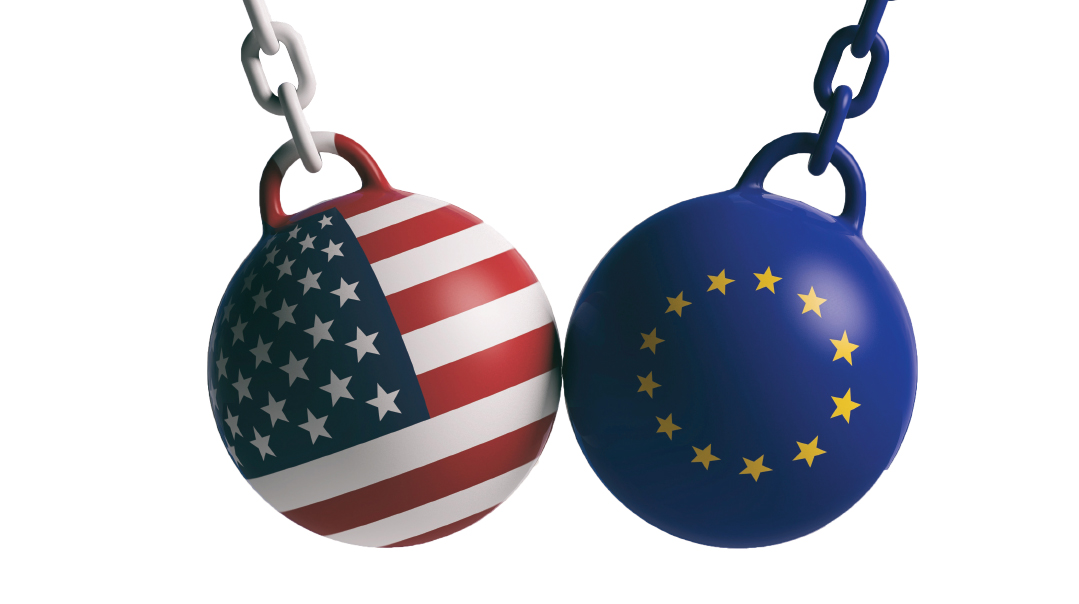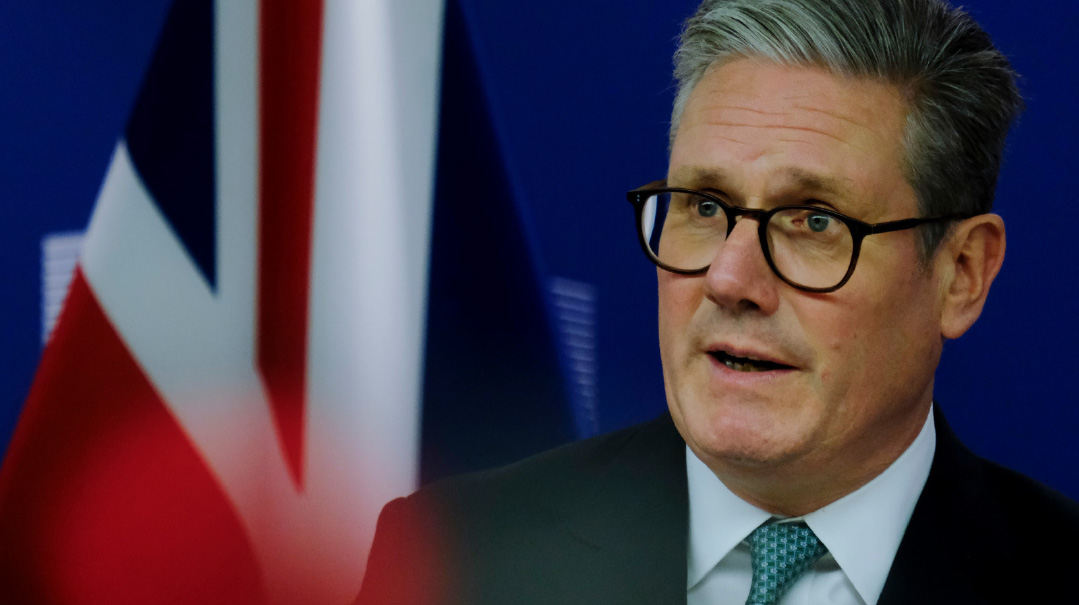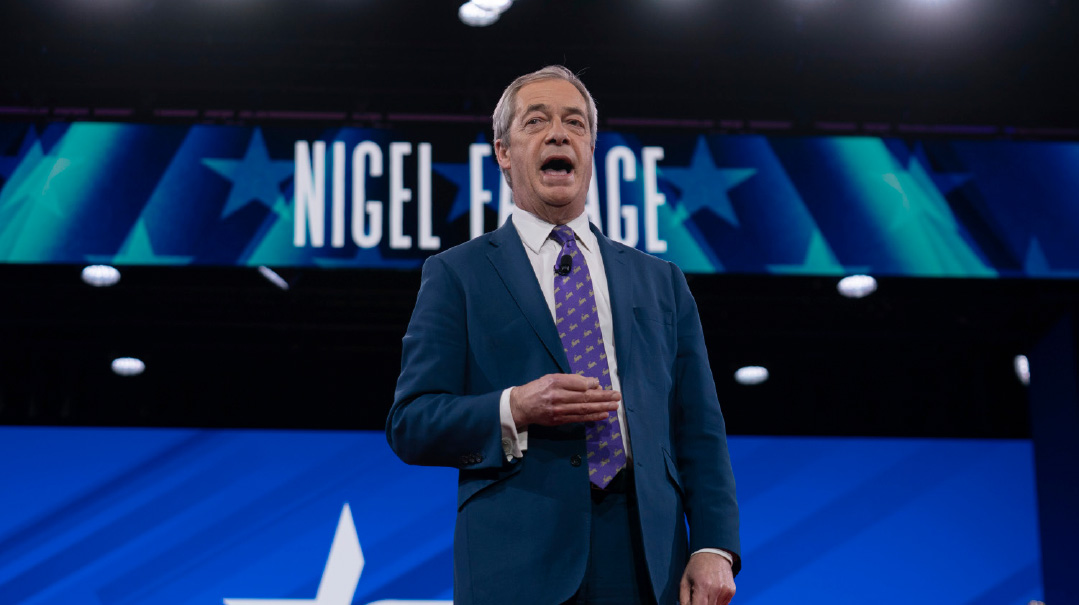Trump’s European War

President Trump is looking to pry the United Kingdom out of Brussels’s orbit on everything from trade to foreign policy

Seventy-five years after American troops stormed the beaches of Normandy on D-Day, the United States is poised to take the fight to Europe once again — this time in a trade war. And with Britain in desperate need of a post-Brexit trade deal to add to the so-called “Special Relationship” with the US dating back to World War II, President Trump is looking to pry the United Kingdom out of Brussels’s orbit on everything from trade to foreign policy.
Speaking at the White House before leaving for the G7 summit with European leaders in Biarritz, France, at the beginning of this week, President Trump threatened to hit France with tariffs in response to the tax on tech companies recently passed by French president Emmanuel Macron’s government.
“I’m not a big fan of the tech companies because they were very much opposed to the Republicans,” Trump said, “but I don’t want foreign countries unfairly taxing our companies. And if they do that, we’ll be taxing their wine like they’ve never seen before.”
But Chardonnay is far from the only thing in Trump’s sights. Despite the trade surplus that the US enjoys vis-à-vis the European Union because of large service sector exports, Trump is angered by the ongoing deficit in goods trade — $169 billion in 2018, according to the US Trade Representative. So, although America is locked in a gargantuan trade war with China with no end in sight, the Trump administration looks set to open a second front by imposing tariffs on up to $25 billion of European imports, on everything from German cars to Italian cheese and Scotch whisky.
EU trade commissioner Cecilia Malmström recently told officials in Brussels that they should prepare for tariffs in response to a case that Washington has brought at the World Trade Organization alleging unfair EU subsidies to aerospace giant Airbus.
If trade wars are drawing a sharp line between the US and EU, on foreign policy the two are looking like inhabitants of different planets. Trump has been frustrated by the refusal of the Europeans to bin the 2015 Iran deal. Apart from Britain, European countries have refused to join the US-led naval patrols in the Persian Gulf aimed at deterring Iran. The EU, meanwhile, was aghast as the Americans walked away from the 2016 Paris climate change agreement — a sacred cow for the Europeans. The difference between the two was highlighted by American complaints of the G7 being diverted by Macron into “niche issues” such as the climate and equality.
But if Europe is increasingly estranged from the US, Britain looks like it’s being propelled by Brexit — like it or not — into a crushing bear-hug from America.
Speaking alongside new British prime minister Boris Johnson at the G7, Donald Trump made it clear that the US was eager to do a major free trade deal with Britain as soon as it had exited the EU on November 31. “We’re going to do a very big trade deal — bigger than we’ve ever had with the UK,” Trump said, when they won’t have the EU as an “anchor around their ankle.”
Trump’s comments, which echo those of senior American officials who’ve spoken of an agreement on day one after Brexit, are music to the ears of Brexiteers who see a US trade deal as leverage over the EU. Writing at the BrexitCentral website, British economist Professor Patrick Minford says that post-deal, UK businesses will be able to undercut EU-based competitors once freed of EU tariffs. This in turn will incentivize the Europeans to sign a deal.
It’s leverage that the UK needs. As things stand, European leaders are in no rush to offer Boris Johnson better terms than his predecessor Theresa May negotiated. Johnson once again threatened to withhold £30 billion of the (previously agreed to £39 billion) EU divorce bill in the event of no-deal — blowing a gaping hole in the EU budget. But Emmanuel Macron, the most hawkish European leader when it comes to Brexit, is unmoved. “In the next month, we won’t find a new withdrawal agreement that will be very different from what we have,” he told Johnson.
And with a large body of British MPs willing to countenance anything — including a Jeremy Corbyn premiership — to block a no-deal Brexit, European leaders are not inclined to concede anything to Johnson. That will only change once it becomes clear in September — after Parliament reconvenes — whether or not the anti-Brexit rebels have enough firepower to bring down Boris.
As Johnson is acutely aware, a US deal will come at a price for Britain. When it comes to tough negotiating, the Americans have form going back to World War II, when the Roosevelt administration bagged Britain’s industrial crown jewels as the price for supplying arms under the Lend-Lease agreement.
The US is casting a covetous eye on Britain’s National Health Service, a behemoth with a budget of £110 billion in 2018 alone. Johnson has repeatedly ruled out including the NHS as a part of a trade deal, but the battle hasn’t begun yet.
At the same time, the US is eager to break intra-European unity on Iran and China. The UK’s foreign policy had a continental outlook under Theresa May. It refused to blacklist Huawei from 5G communications network contracts despite pressure from the Trump administration, which sees the company as an arm of the Chinese security services. Britain also refused to walk away from the Iran deal. Johnson might want to continue those policies to curry favor with European leaders in Brexit negotiations. But on the other side of this tug-of-war is Trump, who wants to bring a hefty partner onside for his foreign policy — and Brexit Britain looks ripe for a close alignment on the issues close to the president’s heart.
Going forward, the EU will try to reduce its dependency on the US. As a European army looks like a pipe dream, it will still need America’s military muscle. But as the recent creation of a €100 billion innovation fund shows, Europe is determined to compete with the US over trade. That, in turn, will lead to friction — especially if Donald Trump wins a second term in 2020.
Navigating warily between the two giant blocs will be Brexit Britain, mindful of a previous French leader’s dictum. As Charles de Gaulle once said after cutting off support to Israel, “no nation has friends — only interests.”
It’s something that the history-minded Johnson is acutely aware of.
(Originally featured in Mishpacha, Issue 775)
Oops! We could not locate your form.













